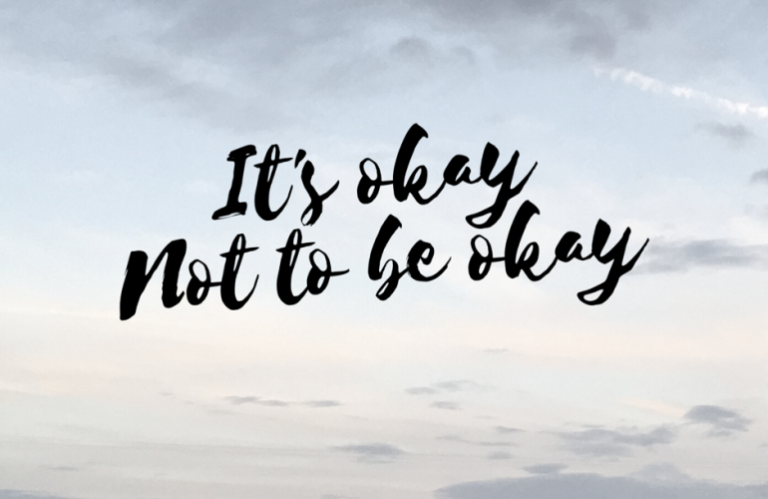I’ve talked with lots of people lately about the issues and problems they face every day. It’s been interesting that one particular observation seems to help many of them feel better about life, and about themselves. That statement is:
“It’s okay not to be okay.”
The simple assertion that it’s not wrong, bad, weak, sinful, shameful, to not be okay. In fact, that it is totally normal to feel that way at times.
If sometimes you are not okay, please understand deep in your heart that it’s okay. I mean it; it really is okay. You’re normal, and we all have issues. You have great worth and value, and God loves you deeply and personally. You have hope for a positive future. It really is okay.
And we need to realize this discussion is more important that simply helping people feel better.
Because believing it’s not acceptable to ever feel bad only makes people feel worse. And it discourages them from reaching out for help. In some cases, this traps them in a downward spiral of shame that can lead to unhealthy ways of feeling better, such as alcohol, drugs, or addictive behaviors. This cycle of shame, isolation, and addiction is a tragically common problem:
“90% of people with addiction issues never get help.”
It’s okay not to be okay. But many people don’t feel that way, and it is destroying them.
Whoever You Are, It’s Okay Not to Be Okay
All people feel bad sometimes, but most keep their negative feelings to themselves. We need to adjust our expectations: life will not always be okay. We all have issues and troubles. That’s part of being human—normal—so we should not feel ashamed, broken, alone, or hopeless.
Men: You don’t have to be tough all the time. Having emotions and weaknesses is normal. There’s more than a life of quiet desperation.
Women: You don’t have to carry the weight of unrealistic expectation that you must do everything well all the time, because no one does.
Business people: You may feel you must hide your issues to be respected. Don’t! Good employees admit their weaknesses and work to improve. Great leaders are humble and transparent.
Parents: You don’t have to be perfect to be a great parent. But your kids need you engaged in their lives, so be proactive and do your best.
Teenagers: Social media lies, and your friends are not as happy as they post. They all have issues too, and you are normal to feel the way you do. In fact, 1 in 5 young people deal with depression, and 1 out of 4 suffer from anxiety. It’s okay not to be okay. Really.
Church goers: I know everybody at church looks and acts like everything is okay in their lives, and you may think they don’t have an issue in the world. Guess what? They do, just like you.
Those with an addiction: If you’re alone in addiction, take a step toward freedom. Talk to someone supportive: a spouse, friend, therapist, coach, or pastor. Take a courageous step into a recovery meeting. Perhaps for the first time, you will see that it truly is okay not to be okay.
Recognizing we are not always okay is a step of awareness. It helps us heal. And it’s good to let other people know we’re not okay, because we get better faster by sharing our feelings and being vulnerable. And we can set an example for others to do the same.
Where You Can Go to Feel Better
In recovery, it really is okay not to be okay.
No matter what issues you have, you will be accepted warmly and sincerely. No one will think you different, because they all recognize they are not okay either. They actually talk about not being okay and, by so doing, they become more okay. And help others be more okay too.
In recovery, the Twelve Steps proclaim that it’s okay not to be okay:
- We admitted we were powerless over our problem—that our lives had become unmanageable.
- Admitted to God, to ourselves and to another human being the exact nature of our wrongs.
- Made a list of all persons we had harmed, and became willing to make amends to them all.
- Continued to take personal inventory and when we were wrong promptly admitted it.
And those same steps make it clear the things we can do to get better:
- Sought through prayer and meditation to improve our conscious contact with God.
- Made a decision to turn our will and our lives over to the care of God.
- Humbly asked God to remove all our shortcomings.
- Made direct amends to people wherever possible.
Accept that it’s okay not to be okay and use that as a first step toward a new way of living. A life where you are aware, and connected, and taking positive steps to feel better more of the time.
Because it is also okay to feel okay.
Question: Deep in your heart, do you believe it’s okay not to be okay?
Action: Pick someone who seems down, and help them feel more okay.


